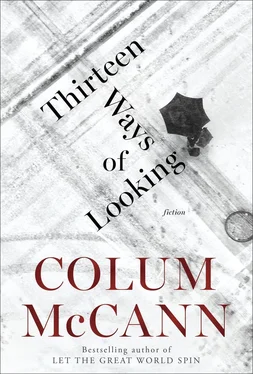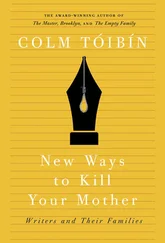Colum McCann - Thirteen Ways of Looking
Здесь есть возможность читать онлайн «Colum McCann - Thirteen Ways of Looking» весь текст электронной книги совершенно бесплатно (целиком полную версию без сокращений). В некоторых случаях можно слушать аудио, скачать через торрент в формате fb2 и присутствует краткое содержание. Год выпуска: 2015, Издательство: Random House Publishing Group, Жанр: Современная проза, на английском языке. Описание произведения, (предисловие) а так же отзывы посетителей доступны на портале библиотеки ЛибКат.
- Название:Thirteen Ways of Looking
- Автор:
- Издательство:Random House Publishing Group
- Жанр:
- Год:2015
- ISBN:нет данных
- Рейтинг книги:5 / 5. Голосов: 1
-
Избранное:Добавить в избранное
- Отзывы:
-
Ваша оценка:
- 100
- 1
- 2
- 3
- 4
- 5
Thirteen Ways of Looking: краткое содержание, описание и аннотация
Предлагаем к чтению аннотацию, описание, краткое содержание или предисловие (зависит от того, что написал сам автор книги «Thirteen Ways of Looking»). Если вы не нашли необходимую информацию о книге — напишите в комментариях, мы постараемся отыскать её.
and
comes an eponymous novella and three stories that range fluidly across time, tenderly exploring the act of writing and the moment of creation when characters come alive on the page; the lifetime consequences that can come from a simple act; and the way our lives play across the world, marking language, image and each other.
Thirteen Ways of Looking Brilliant in its clarity and deftness, this collection reminds us, again, why Colum McCann is considered among the very best contemporary writers.
Thirteen Ways of Looking — читать онлайн бесплатно полную книгу (весь текст) целиком
Ниже представлен текст книги, разбитый по страницам. Система сохранения места последней прочитанной страницы, позволяет с удобством читать онлайн бесплатно книгу «Thirteen Ways of Looking», без необходимости каждый раз заново искать на чём Вы остановились. Поставьте закладку, и сможете в любой момент перейти на страницу, на которой закончили чтение.
Интервал:
Закладка:
— Sorry, Dad.
— Oh, that’s okay, go ahead, take it, really, it’s okay.
Though it’s not okay, it’s far from okay, it’s light years from okay — just do the right thing and turn the phone off, would you, please, son, keep Allen Funt locked in the kitchen, smile, you’re the star of the show, oh, the mind is a trampoline today, it was Allen Funt, wasn’t it? They were good years, uncomplicated, or so they seemed anyway, we gathered around the television together for the nightly shows, a long thin Elliot sprawled out on the carpet, Katya curled into her beanbag, he and Eileen in matching armchairs, the room was cozy, the fire was lit, there were belted ashtrays that hung around the arm of the chairs, and he smoked a pipe then, I haven’t touched a pipe in I don’t know how long, haven’t even smelled a cigarette for years.
A strong insistent whisper this time: I told you, I’m having lunch, don’t call me with this bullshit again.
Then a dip towards his wineglass: Sorry, Dad.
— Do you remember when they used to allow you to smoke in restaurants?
— Excuse me?
— I was just thinking about how everyone used to smoke. I still have the pipe, you know. In the bedroom.
— Nobody smokes pipes anymore, Dad.
— You can still smell the smoke in the bowl. If you put it to your nose. It lingers.
Elliot glances down at the phone again. And what is it that lingers anymore? Really what I want to talk to you about is those old days with your mother, when we were all together, and life rolled along, slow enough, day to day, and why is it that we complicate the past, is it simply just pipesmoke? But here we are, listening to you prattle about the bitcharita and yet another excuse for being late, and surely there’s something else, son? Should I have another try at my memoirs? Should I give Sally James a raise? Would you like another glass of Cabernet? How in the world are you going to fill that five-car garage? Could a man even poison himself with carbon monoxide in a place that big? No, no, tell me this and tell me no more: Do you miss your mother, son? Or tell me this: Do you recall the days we spent at the beach in Oyster Bay? Or tell me this: Do you ever return to the thought of her with the hint of a sigh?
And there it is again, the goddamn phone bronco-bucking on the table. From across the room come a few darting looks. He’s not mine, I promise you, he’s an alien — they make them big and blue-eyed and American now. A tut-tut from one of the Ladies Who Lunch, and a sympathetic tilt of the head from the waitress.
Rosita, Maid Marion, come rescue me, cart my son out into the snow, deposit him there, bring your bow and arrow, take careful aim, and shoot the fucking Apple off his head like Robin Hood, or indeed William Burroughs.
Elliot leans across and with the charm of which he is sometimes capable says: Do you mind, Father? I really have to take this one.
Do I what? Of course I mind. Here we are, breaking bread, and all you want to do is jabber on endlessly. There was once a time when you’d sit in the kitchen alcove, and we’d lean together over mathematics, quadrangles, quadratics, as close as any two could get, multiplied by one another. How long has it been since we actually looked at each other, tell me that, son. I’m a sentimental old fool, I’m dripping with nostalgia, but cynics bore me, and I might as well wear my heart on my sleeve, I’d like to talk to you without interruption, can you give me at least that?
— No problem, Elliot.
— Thanks, Dad.
He turns sideways in the chair, cups his hand over the phone, his big gold wedding ring shining. Hear no evil, see no evil, speak no evil. A silver bracelet on his wrist. To keep the vampires away. Didn’t work with Jacintha, that’s for sure. There is something afoot with Elliot, he can hear bits and pieces coming in his direction, a male voice this time, he jigsaws them both together, she was fired, fair and square, that’s extortion, there’s just no way, I’ll sue her, how dare she, who does she think she is, she’s a goddamn secretary, I don’t give a fuck what she calls it, look, Dave, I’m in a restaurant with my father, she just can’t, can you give me an hour, it was fair and square — goddammit, just take care of it, would you? — that’s what I pay you for, she wants a lawsuit she’ll get a lawsuit, executive assistant my ass, bring it on.
More to it always than meets the eye. How many women have slung accusations Elliot’s way? Hi, Barner Funds, Elliot Mendelssohn’s office, how can I help you? Save me a place in the unemployment line please, my boss just called me a bitcharita.
— Sorry, Dad, he says again, rolling his eyes at the phone and leaning across the table to take some bread from the basket.
No worries, son, I’ll just sit here awaiting my salmon with dill sauce and let the lazy day drift away.
— I’ll be right with you, I promise.
And there he goes with the finger again, and a shake of his jowls — he looks farm-caught himself, open-mouthed — and he is scooting back his chair, half the restaurant looking at him, hook, line, sinker.
Where in the world did I go wrong, did I ruin his childhood, did I neglect him, did I not read the right books to him, did I drop him on the crown of his early bald head? He came through the teenage years with flying colors, never caused too many problems. A good-looking kid, came home with his lacrosse trophies, debate certificates, chess medals. No late-night phone calls. No suspensions. No arrests. Amherst, then Harvard, got himself to Wall Street, hunkered down for a couple of years, played the money game, rolled the ball, made it round, but just look at him now, walking past the empty tables, towards the restrooms, watched by Dandinho all the way. An odd look on Dandinho’s face. Surely he’s seen many a customer chatting on the phone, cheating on the phone even? Maybe there’s a house rule against it, cheating and chatting?
I could do with another glass of Sancerre, where’s my medium-medium blonde, come to me, what is your name again, Rosita, Rosita, my stem, my petal, my thorn.
IX
When the blackbird flew out of sight,
It marked the edge
Of one of many circles.
If only real life could have the logic of the written word: characters with conscious actions, hidden causes becoming plain, all things moving toward a singular point, the universe revealing itself as inexorably stable, everything boiled down to a static image, controlled, ordered, logical. In a simple world it should have been a straightforward Jewish funeral, but Mendelssohn was an atheist, or so it was said anyway, agnostic at least, though he certainly had a touch of tradition to him, and he wasn’t averse to playing whatever card suited him. He had married a Catholic woman, and the children were raised between religions, and Mendelssohn himself had confessed to being Jewish when he wanted to be, and Lithuanian most of the time, but Polish if he needed to be, a touch of Russian if so charged, an American in most respects, an occasional European, even Irish every once in a while by virtue of his wife. A mongrel really, a true New Yorker, in a city where people never knew how to die. Cremation. Exhalation. Annihilation. A proper Jewish ceremony would have seen him buried as soon as possible, but then there was the issue of an autopsy and the delay of Mendelssohn’s daughter all the way from Tel Aviv, and the political aspirations of the son, and where his wife, Eileen, was buried, and whether his ashes should be scattered or not, and what he might have written in his will, and who might have had access to his very last wishes.
The service takes place on Amsterdam Avenue in the late morning, five days after the assault. The snow has turned to slush and there are deep puddles by the curbsides where the cars pull in. A sad splash of wheels in the potholes. It is a high, wide angle, but a good grade of footage: every funeral home in the city has its own series of hidden surveillance cameras. The detectives have, over the years, become watchers of funerals. It often surprises them that there are not more services on reality TV: there is something so compulsively informative about them. The way life gets played out in death. The manner in which the widow falls to her knees. Or not. The way in which the son shoulders the weight of the coffin. Or not. The way the father becomes the sole proprietor of the daughter’s death. Or not. The enigmatic notes arriving with the flowers. Or not. The subtle dig put in the eulogy by the rabbi, the priest, the imam, the vicar, the monk. Funerals as indicators of a life, how it was lived, the amount of tears shed, the keening and the rending of clothes, the sheer volume of mourners who choose to show up, the length of time people hang around afterward, the very nature of the way they hold their bodies. It has even struck them at times that they can tell some of the sexual predilections of the deceased just by looking at the clothes the mourners wear: the higher the hemline, the more ambitious the life. Hardly a mathematical formula, but then again so many things are unexplainable, and how is it that we know a life, except that we know our own, and it is brought into focus by the death of those around us.
Читать дальшеИнтервал:
Закладка:
Похожие книги на «Thirteen Ways of Looking»
Представляем Вашему вниманию похожие книги на «Thirteen Ways of Looking» списком для выбора. Мы отобрали схожую по названию и смыслу литературу в надежде предоставить читателям больше вариантов отыскать новые, интересные, ещё непрочитанные произведения.
Обсуждение, отзывы о книге «Thirteen Ways of Looking» и просто собственные мнения читателей. Оставьте ваши комментарии, напишите, что Вы думаете о произведении, его смысле или главных героях. Укажите что конкретно понравилось, а что нет, и почему Вы так считаете.












